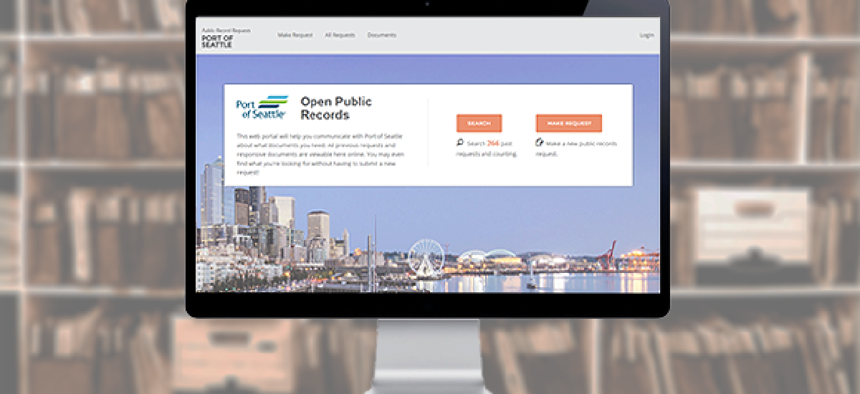Public record requests made easy (for government)


Connecting state and local government leaders
The Port of Seattle is using NextRequest, a cloud-based public records management portal, to simplify the request process for both citizens and the government employees who field the questions.
Many of the latest apps and services dedicated to public records requests have been on the demand side of the equation. Far fewer resources have been devoted to helping those on the supply side – the government agencies charged with finding the information and filling those requests.
Like many state and local – and even federal – agencies, the Port of Seattle received most of its requests for public records via email. The port received 329 requests in 2014 and about 270 so far this year, and keeping track of hundreds of requests per year through Microsoft Outlook was getting too cumbersome. In addition, large electronic files had to go out as multiple attachments or on a CD because of the email system’s limitations on file sizes.
Jerome Wilen, the port’s public disclosure manager and public records officer, turned in January to NextRequest, a cloud-based public records management portal that makes the public records request process easier for both requestors and the government employees who field the questions.
For government offices, NextRequest provides a central location to store all of the communications – internal and external -- related to a disclosure request. Staff can collaboratively upload documents, provide links, review information provided by other staff that's related to specific queries and close requests. The system also has built-in reminders for staffers to ensure compliance with records laws.
Metrics let agencies identify high-demand information, which they can then flag for site visitors, potentially cutting down on repeat requests.
Citizens make their document requests through an online form and receive automatic status updates whenever action is taken on their request. The responses and communication are visible online in real time.
The searchable archive helps citizens quickly find documents that have been requested by other, which cuts down on multiple requests for the same documents. The archive search also saves time for government staff charged with filling requests.
NextRequest provides a single place for requestors to look for information and ensures that requests are routed to appropriate document managers and departments. It also serves as a central hub where document officials communicate to resolve the requests.
“With NextRequest, the requestor has the ability to download files through the application, which also provides more transparency as other potential requestors can download those same documents without having to make a public disclosure request for the same records,” Wilen said. “Our correspondence is also done through NextRequest, so all the communication with each requestor is kept in one centralized location.”
But NextRequest can help even before a query is even submitted, said company CEO Tamara Manik-Perlman. Users can search NextRequest’s database to see if the information they seek has already been made public, and the system also tracks keywords and can pop open an alert box to let searchers know that the documents they want might already be available -- even if their search query does not produce an exact match. It can also inform them that they’re looking in the wrong place and suggest departments that might be able to better address their requests.
When a request is submitted, the platform assigns it a unique ID number, routes it to a primary public records custodian or liaison, and automatically calculates a due date for that request based on the applicable state laws, Manik-Perlman said. If resolving the request involves multiple departments, NextRequest allows the main contact person to add staff members who might have responsive documents, and then those people can add information as it arises. The system logs all internal communications within the request ticket.
The system will automatically remind the departmental contact when a request is due, which helps agencies comply with the law, Manik-Perlman said. It also ensures the public gets a response in a timely manner.
Since information can be released as it is located, requestors don’t have to wait for one final, cumulative response. And citizens get regular updates on the status of their request. “Whenever the government takes an action on the request, a notification goes out automatically both to the agency staff who are added to the request but also to the requestor.”
NextRequest’s costs are based on request volume, although most state and local entities don’t know that statistic, Manik-Perlman said. So, population is a proxy, but the low end is about $3,000 per year, and the high end is about $50,000. In contrast, traditionally managed requests typically cost governments about $400 each to fulfill, according to NextRequest.
“The return on investment is an inexpensive process that has made managing requests and providing documents much more streamlined and has avoided, for the most part, the use of responding to requests and providing documents by email, including other forms of media (i.e., CDs and flash drives), which can be costly over time,” Wilen said.
NextRequest is focused on state and local governments for a few reasons. First, the Freedom of Information Act covers only federal agencies, and while state laws are based on it, there’s no uniformity. Additionally, Manik-Perlman said, municipalities often don’t have the tools they need and frequently overburden employees by asking them to deal with requests on top of their primary responsibilities.
NextRequest has roots in Code for America. The 2013 fellows built an app called RecordTrac to help record managers in Oakland, Calif. When the CfA fellowship ended, the team looked for a way to make what they created redeployable for other cities. Last fall, they rewrote the code from scratch to create the current software-as-a-service application that any government agency can use.
NEXT STORY: CRM, MDM services get FedRAMP approval




